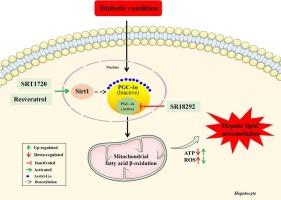Sirt1 介导的 PGC-1α 去乙酰化可通过改善线粒体脂肪酸氧化减轻 2 型糖尿病患者的肝脂肪变性。
IF 4.4
2区 生物学
Q2 CELL BIOLOGY
引用次数: 0
摘要
过氧化物酶体增殖激活受体-γ辅激活子-1α(PGC-1α)通过去乙酰化被激活,已成为代谢相关疾病的重要调节因子。白藜芦醇对 Sirtuin 1(Sirt1)的激活作用可能是使 PGC-1α 去乙酰化。然而,去乙酰化的 PGC-1α 在缓解活化的 Sirt1 对与 2 型糖尿病(T2DM)相关的脂肪肝(FLD)的影响方面所起的作用仍有待探索。本研究旨在探讨 Sirt1 介导的 PGC-1α 去乙酰化对 T2DM 相关脂肪肝的潜在影响及其内在机制。我们的研究结果表明,在高糖(HG)和游离脂肪酸(FFA)共同刺激的肝细胞中,随着 Sirt1 的减少,乙酰化 PGC-1α 的水平也上调。下调的 Sirt1 通过抑制 PGC-1α 的去乙酰化使其失活,而激活的 Sirt1 则通过 PGC-1α 的去乙酰化减少脂滴积累,从而改善肝损伤。然而,体外 PGC-1α 拮抗剂抑制了激活 Sirt1 对肝脏脂肪变性的有益作用。从机制上讲,激活 Sirt1 可通过促进 PGC-1α 的活性来增强线粒体功能,从而促进肝脏脂肪酸氧化(FAO)。总之,Sirt1介导的PGC-1α去乙酰化可通过增强线粒体脂肪酸氧化作用减轻肝脏脂肪毒性,从而有助于恢复T2DM的线粒体功能。激活 Sirt1 介导的 PGC-1α 去乙酰化可能是治疗 T2DM 相关 FLD 的一种有前景的方法。本文章由计算机程序翻译,如有差异,请以英文原文为准。

Sirt1-mediated deacetylation of PGC-1α alleviated hepatic steatosis in type 2 diabetes mellitus via improving mitochondrial fatty acid oxidation
Being activated by deacetylation, peroxisome proliferator-activated receptor-γ coactivator-1α (PGC-1α) has become an important regulator of metabolic-related diseases. The activation of Sirtuin 1 (Sirt1) by resveratrol was likely to deacetylate PGC-1α. However, the role of deacetylated PGC-1α in the alleviation of activated Sirt1 on type 2 diabetes mellitus (T2DM)-related fatty liver disease (FLD) remained unexplored. The aim of this study was to investigate the potential impact of Sirt1-mediated deacetylation of PGC-1α on T2DM-associated FLD and its underlying mechanisms. Our findings revealed that, along with the decreased Sirt1, the levels of acetylated PGC-1α were up-regulated in hepatocytes co-stimulated with high glucose (HG) and free fatty acids (FFA). Down-regulated Sirt1 inactivated PGC-1α by inhibiting its deacetylation, while activating Sirt1 improved hepatic injury by reducing lipid droplet accumulation through the deacetylation of PGC-1α. However, the beneficial effects of Sirt1 activation on hepatic steatosis were inhibited by PGC-1α antagonist in vitro. Mechanistically, activating Sirt1 enhanced mitochondrial function by promoting PGC-1α activity, thereby facilitating hepatic fatty acid oxidation (FAO). In conclusion, Sirt1-mediated deacetylation of PGC-1α mitigated hepatic lipotoxicity by enhancing mitochondrial FAO, which contributed to the restoration of mitochondrial function in T2DM. The activation of Sirt1-mediated PGC-1α deacetylation might represent a promising therapeutic approach for T2DM-associated FLD.
求助全文
通过发布文献求助,成功后即可免费获取论文全文。
去求助
来源期刊

Cellular signalling
生物-细胞生物学
CiteScore
8.40
自引率
0.00%
发文量
250
审稿时长
27 days
期刊介绍:
Cellular Signalling publishes original research describing fundamental and clinical findings on the mechanisms, actions and structural components of cellular signalling systems in vitro and in vivo.
Cellular Signalling aims at full length research papers defining signalling systems ranging from microorganisms to cells, tissues and higher organisms.
 求助内容:
求助内容: 应助结果提醒方式:
应助结果提醒方式:


